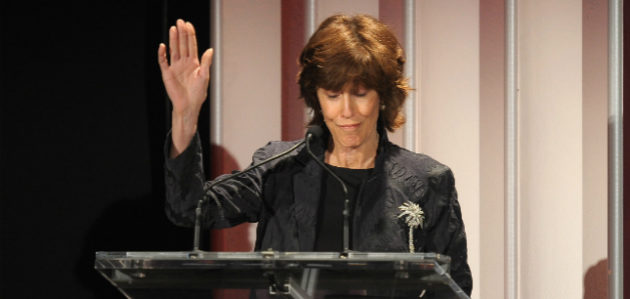In Memoriam: Nora Ephron, AKA Nora and Me

She never left New York City after the split with Bernstein, an ugly, much litigated divorce even by celebrity standards. In fact, Ephron is said to have come up with the idea for the "divorce" section of the Huffington Post, edited by her friend Arianna Huffington. But by all accounts, especially her own ("I love my marriage") her third marriage to journalist and screenwriter Nick Pileggi (Goodfellas, Casino) has been a great success.
Still, it's always all about women — in journalism, movies, theater. With Delia again, she wrote the play Love, Loss, and What I Wore, about women and their wardrobes in 2010.
So it was a surprise to get her uncliched response to questions about women's struggles in the movie business, the crux of my interview with her. At the time of my talk with her the Writers Guild was listing 33 women and 1500 men screenwriters. (Today the official number is 19% females.) Ephron's teaching example: When Harry Met Sally. "Once I took a brief hiatus from the film and when I came back there were suddenly sixteen scenes about Harry. Then I had to even it out. In film as in fiction, it's very rare that you get a Henry James who writes about women... maybe James Brooks and Lawrence Kasdan. It's not that the roles for men are so great. There's just more of them."
Is the industry responsible in any way? "It's not that the studios conspire to not have good parts for women. It's that if women don't write movies there aren’t going to be that many good roles for women."
And even more startlingly: "I myself haven't experienced discrimination. Ageism, yes. Not sexism. In the 1940s when my parents went out to Hollywood, there were some women writers but they were mostly married to men writers. Some were friends of my parents, like Fay and Mike Kanin, or Frances Goodrich and Albert Hackett. Then there weren't any, paralleling all of America, right? After World War II? When women were pushed out of the job market."
Nora Ephron died after a six year struggle with leukemia, one of the few personal topics she did not write about (see I Feel Bad About My Neck, book-ending the youthful "Breasts" piece.) She even wrote about her about her own mother's death, saying most famously — some say apocryphally — that Phoebe Ephron ordered on her deathbed "Take notes, Nora. It's all copy."
I wouldn't presume to guess what Ephron would have said of her own death (though she gave a hint in the "Things I'll Miss" [when I'm gone] section of I Remember Nothing). But I would share the tongue-in-cheek inscription she wrote on the inside flap of the copy of When Harry Met Sally... which she gave me, sending me off — the much lesser known and important — to write my version of Ephron's place in film, and women and film.
"'To Marsha — Be kind' Nora." Nice, but with an edge. Typical Nora Ephron.
Marsha McCreadie has written four books on women and film, including The Women Who Write the Movies (Birch Lane Press). She was the staff film critic at the Arizona Republic for many years, currently reviews for Film Journal International, and her film articles have been published in the New York Times, the Los Angeles Times, Film Comment, sensesofcinema, and many other publications.
[Photo: Nora Ephron receives an award at the 2011 Directors Guild Of America Honors, via Getty Images]
Pages: 1 2
